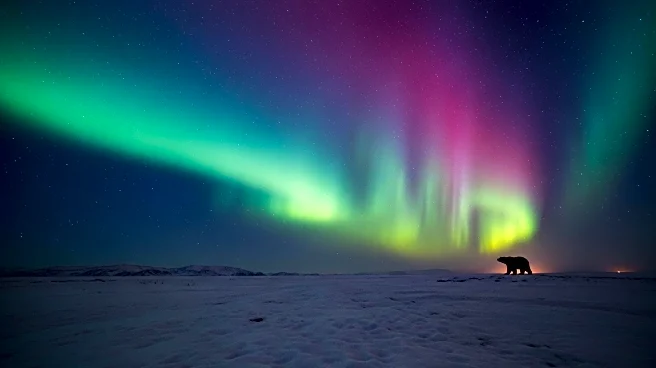What's Happening?
Recent research has traced the recovery of ozone in the Arctic, highlighting significant changes in ozone concentration across different stratospheric levels. The study utilized data from the Stratospheric Water and Ozone Satellite Homogenized (SWOOSH) and other satellite datasets to analyze trends from 1988 to 2024. Findings indicate that ozone concentration is higher in the lower stratosphere during winter months, with significant variability influenced by temperature-dependent photochemical reactions and atmospheric dynamics. The study also examined the impact of various meteorological parameters, such as the Brewer-Dobson circulation, on ozone transport from the tropics to the Arctic. The analysis revealed significant positive trends in ozone levels in the upper stratosphere post-2000, contrasting with negative trends observed pre-2000 due to high halogen loading.
Why It's Important?
The recovery of ozone in the Arctic is crucial for mitigating the effects of climate change and protecting ecosystems. Ozone plays a vital role in shielding the Earth from harmful ultraviolet radiation, and its recovery can lead to reduced risks of skin cancer and other health issues. The positive trends post-2000 suggest that international efforts, such as the Montreal Protocol, have been effective in reducing ozone-depleting substances. This recovery also has implications for atmospheric dynamics and climate patterns, potentially influencing weather systems and temperature regulation in the Arctic region. Stakeholders in environmental policy and public health stand to benefit from these findings, as they provide evidence of successful global cooperation in environmental protection.
What's Next?
Future research will likely focus on monitoring ongoing trends in ozone recovery and understanding the long-term impacts on climate and atmospheric conditions. Scientists may explore the role of other environmental factors, such as greenhouse gas emissions, in influencing ozone levels. Additionally, policymakers might consider strengthening international agreements to further reduce ozone-depleting substances and address other environmental challenges. Continued collaboration between scientific communities and governments will be essential to ensure the sustainability of ozone recovery efforts and to adapt strategies based on emerging data.
Beyond the Headlines
The study's findings underscore the importance of global cooperation in addressing environmental issues. The success of the Montreal Protocol serves as a model for tackling other challenges, such as climate change and biodiversity loss. Ethical considerations arise in balancing economic interests with environmental protection, highlighting the need for policies that prioritize long-term ecological health over short-term gains. The recovery of ozone also prompts discussions on the interconnectedness of global ecosystems and the shared responsibility of nations in preserving the planet for future generations.










